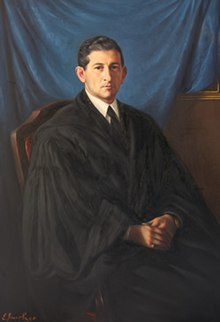Giorgio Borg Olivier
|
Doctor The Honourable Giorgio Borg Olivier GCPO, KSS, LLD |
|
|---|---|

Prime Minister Giorgio Borg Olivier's official portrait
|
|
| 7th Prime Minister of Malta | |
|
In office 5 March 1962 – 21 June 1971 |
|
| Monarch | Elizabeth II |
| Governor-General |
Guy Grantham Maurice Henry Dorman Maurice Henry Dorman |
| Preceded by | Position re-established |
| Succeeded by | Dom Mintoff |
|
In office 20 December 1950 – 11 March 1955 |
|
| Monarch |
George VI Elizabeth II |
| Governor-General |
Gerald Creasy Robert Edward Laycock |
| Preceded by | Enrico Mizzi |
| Succeeded by | Dom Mintoff |
| Personal details | |
| Born | 5 July 1911 Valletta, Malta |
| Died | 29 October 1980 (aged 69) Sliema, Malta |
| Nationality | Maltese |
| Political party | Nationalist |
| Spouse(s) | Alexandra Mattei (m. 1943-1980; his death) |
| Children | Angela Alexander Peter |
| Alma mater | Royal University of Malta |
| Occupation | Attorney, politician |
| Religion | Roman Catholic |
Giorgio Borg Olivier (Maltese: Ġorġ Borg Olivier) (5 July 1911 – 29 October 1980), also known as George Borg Olivier, was a Maltese statesman and leading politician. He twice served as Prime Minister of Malta (from 1950–55, and from 1962–71) as the Leader of the Nationalist Party. He was also Leader of the Opposition between 1955–58, and again between 1971-77.
Borg Olivier was elected as one of the three Nationalist members of the Council of Government in 1939. In May 1940, when the leader of the Nationalist party, Enrico Mizzi, was first interned by the British and deported, Borg Olivier became interim leader. After his return, Mizzi made Borg Olivier his deputy. Rising to office as a protégé of Mizzi and Sir Ugo P. Mifsud, Borg Olivier believed in the economic and social development of Malta as a viable independent state and in the necessity of a mixed economy. During his premiership, he pursued corporatist policies to develop the tourism industry and construction as the engine of growth. Under his leadership, average living standards rose steadily as Malta began to decouple from a fortress economy purely dependent on the British military establishment.
Near the end of his rule as prime minister, his government was rocked by various political and personal scandals, which seemed to symbolise the moral decay of the Maltese political establishment. Resigning from Leader of the Nationalist Party in 1977, Borg Olivier retained his parliamentary seat until his death in 1980. He was succeeded as leader of the party by Eddie Fenech Adami.
Giorgio Borg Olivier was born in Valletta, the son of Olivier Borg Olivier de Puget Paleologo and Rosa (née Amato), and had had a sheltered childhood lived in the Valletta of the 1920s and 1930s.
Borg Olivier grew up in a family steeped in Nationalist politics. His uncle Salvatore was speaker of the house and then a senator, and led the opposition to Lord Strickland's Constitutional Party in the 1920s before becoming a cabinet minister during the premiership of Ugo P. Mifsud in the early 1930s. Borg Olivier followed in this uncle's footsteps by becoming a notary.
...
Wikipedia
